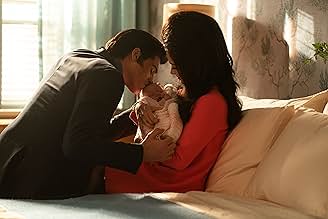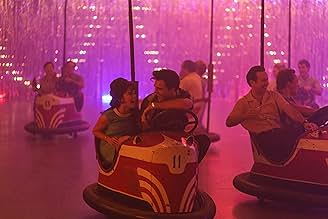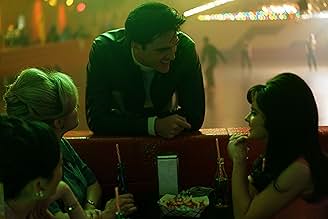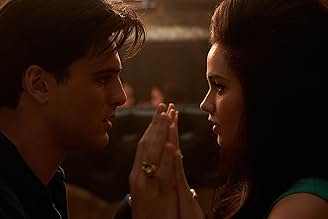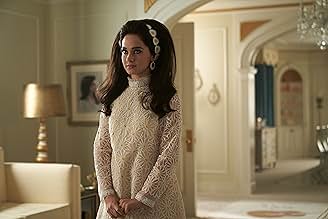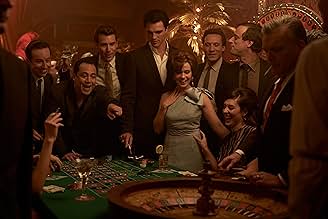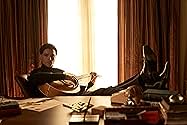Cuando Priscilla Beaulieu conoce a Elvis Presley, el hombre que ya es una superestrella del rock and roll se convierte en alguien totalmente inesperado: un enamoramiento emocionante, un alia... Leer todoCuando Priscilla Beaulieu conoce a Elvis Presley, el hombre que ya es una superestrella del rock and roll se convierte en alguien totalmente inesperado: un enamoramiento emocionante, un aliado en la soledad, un mejor amigo vulnerable.Cuando Priscilla Beaulieu conoce a Elvis Presley, el hombre que ya es una superestrella del rock and roll se convierte en alguien totalmente inesperado: un enamoramiento emocionante, un aliado en la soledad, un mejor amigo vulnerable.
- Dirección
- Guionistas
- Elenco
- Premios
- 6 premios ganados y 35 nominaciones en total
Dan Beirne
- Joe
- (as Daniel Beirne)
- Dirección
- Guionistas
- Todo el elenco y el equipo
- Producción, taquilla y más en IMDbPro
Opiniones destacadas
Before Elvis Presley's daughter Lisa Marie passed away earlier this year, she was quite contemptuous over Sofia Coppola's portrayal of her parents in her biographical feature Priscilla. Based on Priscilla Presley's 1985 memoir Elvis and Me, the film has nonetheless garnered mostly positive reviews and even earned Cailee Spaeny the Volpi Cup for Best Actress at the 2023 Venice Film Festival. Given that Priscilla herself was an executive producer on this project, it's best to look at this project at a more earnest portrayal of Elvis and Priscilla instead of it being romanticized or sugar coated.
Now as this film depicts the courtship between a then 14 year old Priscilla and a then 24 year old Elvis, the biggest takeaway from this feature is that it's supposed to comment more on the idea of love being difficult to obtain as the wife of a global superstar. While it does depict a taboo romantic subject in mind, it becomes far more toxic when Elvis proves to be far more manipulative and abusive than his rockstar persona claims otherwise. Cailee Spaeny and Jacob Elordi share quite a conflicting bond as their depictions show a more disturbing underbelly to what the public thought of the Presleys otherwise. Coppola makes sure to emphasize the unfortunate implications behind their relationship without directly endorsing it, especially as we can see how much the spousal torment and jadedness behind the life of fame creates more misery in Priscilla than to the people worried for her like her parents and socialites. Behind all the rock & roll, glamour and pizazz lies a hollow marriage where one is no longer illusioned to much of anything, be it romance or appreciation for the music.
That being said, outside of the disturbing implications behind Priscilla and Elvis' courtship, there really isn't much else to take away from the movie. By putting so much of Priscilla's perspective into the limelight, the portrayal of her husband isn't interesting enough to dissect beyond him being a fake charming guy who more so likes the idea of a soul mate instead of actually being with one consistently. It doesn't help that the film rushes certain plot points just to get to Presley's life of prestige, such as Priscilla's time with her rightfully concerned family, her trouble focusing in school and even the implied drug addictions she and her husband faced. Despite that latter key point playing a big role in Elvis' abusive behavior, it isn't explored enough to leave much of a dramatic impact. In fact, for a film that tries to incorporate themes of domestic abuse, it feels surprisingly lacking in showing much of that tension. Also, once the film ends, it feels as if it missed the opportunity to go more into Priscilla's life after leaving Elvis for good, almost as if it felt it didn't need to tell more when it should have.
Outside of those qualities, the filmmaking is competent enough yet never rises above decently well crafted in depicting the era of subject. The cultural aesthetic of the late 50s and early to mid 60s feels more tact on for the sake of the time period, as outside of some of the road shows and projects Elvis is apart of, only the costuming sticks out the most, and yet the film hardly does much with them to make much of an impression. If anything, the pop cultural influence from this era feels more like an accompaniment to the story than really playing much of a role beyond the media playing up Elvis' life as more than it really is. Also, the lack of much of a background score surprisingly doesn't work as most of the scenes play out with an awkward tension that would have benefited from more than just what's on the soundtrack. Speaking of which, for some reason there are all kinds of retro and contemporary rock and jazz songs except from the king himself. Perhaps given the involvement of Priscilla Presley and her ex-husband's enterprises, this comes off as understandable yet confusing.
So while made with earnest intentions and captivating performances, Priscilla is a decent enough biopic that falls flat in exploring more about its subject matter beyond superficial love and all the glitz and glamour that comes with it. I would recommend this on the grounds that it's more interesting than it is thought provoking, though definitely take that for what it's worth given how much influence was done by the target at hand. Besides, even if the king is no longer looked at the same way he was then, projects like these are good reminders to not look up to everyone you admire, let alone fall for.
Now as this film depicts the courtship between a then 14 year old Priscilla and a then 24 year old Elvis, the biggest takeaway from this feature is that it's supposed to comment more on the idea of love being difficult to obtain as the wife of a global superstar. While it does depict a taboo romantic subject in mind, it becomes far more toxic when Elvis proves to be far more manipulative and abusive than his rockstar persona claims otherwise. Cailee Spaeny and Jacob Elordi share quite a conflicting bond as their depictions show a more disturbing underbelly to what the public thought of the Presleys otherwise. Coppola makes sure to emphasize the unfortunate implications behind their relationship without directly endorsing it, especially as we can see how much the spousal torment and jadedness behind the life of fame creates more misery in Priscilla than to the people worried for her like her parents and socialites. Behind all the rock & roll, glamour and pizazz lies a hollow marriage where one is no longer illusioned to much of anything, be it romance or appreciation for the music.
That being said, outside of the disturbing implications behind Priscilla and Elvis' courtship, there really isn't much else to take away from the movie. By putting so much of Priscilla's perspective into the limelight, the portrayal of her husband isn't interesting enough to dissect beyond him being a fake charming guy who more so likes the idea of a soul mate instead of actually being with one consistently. It doesn't help that the film rushes certain plot points just to get to Presley's life of prestige, such as Priscilla's time with her rightfully concerned family, her trouble focusing in school and even the implied drug addictions she and her husband faced. Despite that latter key point playing a big role in Elvis' abusive behavior, it isn't explored enough to leave much of a dramatic impact. In fact, for a film that tries to incorporate themes of domestic abuse, it feels surprisingly lacking in showing much of that tension. Also, once the film ends, it feels as if it missed the opportunity to go more into Priscilla's life after leaving Elvis for good, almost as if it felt it didn't need to tell more when it should have.
Outside of those qualities, the filmmaking is competent enough yet never rises above decently well crafted in depicting the era of subject. The cultural aesthetic of the late 50s and early to mid 60s feels more tact on for the sake of the time period, as outside of some of the road shows and projects Elvis is apart of, only the costuming sticks out the most, and yet the film hardly does much with them to make much of an impression. If anything, the pop cultural influence from this era feels more like an accompaniment to the story than really playing much of a role beyond the media playing up Elvis' life as more than it really is. Also, the lack of much of a background score surprisingly doesn't work as most of the scenes play out with an awkward tension that would have benefited from more than just what's on the soundtrack. Speaking of which, for some reason there are all kinds of retro and contemporary rock and jazz songs except from the king himself. Perhaps given the involvement of Priscilla Presley and her ex-husband's enterprises, this comes off as understandable yet confusing.
So while made with earnest intentions and captivating performances, Priscilla is a decent enough biopic that falls flat in exploring more about its subject matter beyond superficial love and all the glitz and glamour that comes with it. I would recommend this on the grounds that it's more interesting than it is thought provoking, though definitely take that for what it's worth given how much influence was done by the target at hand. Besides, even if the king is no longer looked at the same way he was then, projects like these are good reminders to not look up to everyone you admire, let alone fall for.
I have been excited to see this for months - finally out on MAX so I went for it - and the first hour was fantastic . They were both very good in their roles and the chemistry( or lack of ) was very well presented . It took the story of the two of them meeting and made it come to life , the filming was interesting and the general vibe felt spot on . The development in this first part for the characters was great and you really felt like you were being set up to be taken somewhere
And then ....
Then all the sudden the second half it's like the character development just stopped , very little connected together or made sense without background knowledge into the story as a whole , and then the last 20 min it was like "oh shoot we have 20 min better finish it " and no one could figure out exactly how .
The jump from being in an abusive relationship to being her own woman was instant and it all felt very juvenile and hallmark in the end .
Worth watching ? Yes for sure . Not great film but really could have been which made it more disappointing.
And then ....
Then all the sudden the second half it's like the character development just stopped , very little connected together or made sense without background knowledge into the story as a whole , and then the last 20 min it was like "oh shoot we have 20 min better finish it " and no one could figure out exactly how .
The jump from being in an abusive relationship to being her own woman was instant and it all felt very juvenile and hallmark in the end .
Worth watching ? Yes for sure . Not great film but really could have been which made it more disappointing.
It is 1949, and American teenager Priscilla Beaulieu is in Germany with her parents. At a party one night, she meets Elvis Presley, who is stationed in the same military base as her father. The King is drawn to her, while she is smitten by his down-to-earth charm and seemingly genuine humanity. As time goes on, the two forge a relationship, and by 1963, she is living with him in Memphis. However, being The King's wife proves more difficult than she imagined, and far more lonesome.
Written and directed by Sofia Coppola, and based on 'Elvis and Me' by Priscilla Presley and Sandra Harmon, 'Priscilla' is a visually evocative drama both striking and flawed. Firstly, the title is something of a misnomer, as this is not the story of Priscilla Presley's life, rather an overview of the years she spent with Elvis (one wonders why the source material's title was not retained). The narrative focuses on her growing isolation, trapped in Graceland, at the beck and call of her controlling husband. However, due to Coppola's cold approach to the themes of agency and control, her examination of same leaves one oddly unmoved.
Moreover, despite the fact that she is ostensibly the central character, we aren't offered insight into Priscilla's motivations, or aspirations, nor does she have much of a personality. She is a soft-spoken, kind-hearted girl at the beginning and- for all intents and purposes- the very same at the end. Coppola's dialogue lacks wit, while Sarah Flack's ponderous editing leaves proceedings feeling lethargic- all the more so due to the dearth of characterisation and dialogue therein.
Some critics are quick to state that the film is purposefully superficial, that Coppola is interested only in the surface level. By focusing on the skin, as it were, and not the heart beneath, she re-enforces the idea that everything in Elvis's life was an easily purchasable object, even Priscilla. However, as the title would suggest, this is not meant to be a movie about Elvis. Therefore, the scant character development or depth with regard to Priscilla is alienating. We don't have much reason to root for her, except as a result of the obvious distaste engendered by Elvis's mood swings and controlling behaviour.
As a result, the audience feels detached from proceedings, disconnected from the characters both emotionally and psychologically. Although Coppola creates a more human version of The King than viewers saw in Baz Luhrman's 'Elvis' or Liza Johnson's 'Elvis & Nixon', by demythologizing and bringing him down to earth, much of his charisma is diluted. The film's version of the man is a brooding, volatile control freak, without much magnetism or charm. Furthermore, secondary characters are barely more than shadows in darkness; you can hardly make them out at all.
Conversely, Coppola - and frequent collaborator Philippe Le Sourd's - cinematography is stunning. Their composition makes Priscilla appear small and out of place compared to Elvis, like a China doll discarded in a playground. Their use of juxtaposing colours adds to the luxury of Graceland, as well as to Priscilla's isolation, while the soft lighting throughout lends the film an air of romance and intimacy. Everything in the film drips with textural richness, immersing the viewer in a lavish, decadent world, where every surface glistens with silk, velvet and gold.
In addition, Stacey Battat's costume design contributes to the personalities of the characters astutely (perhaps more so than Coppola's screenwriting), heightening the visual contrast between Elvis and Priscilla. Her costume, makeup and hairstyle changes, in particular, mirror her evolution from a shy girl to an independent woman- even if Coppola's screenplay doesn't detail that journey; Priscilla's varying appearance does. Additionally, Tamara Deverell's intricate production design- as well as the set decoration from Patricia Cuccia- lends the film authenticity and realism.
Moreover, the soundtrack is stirring, utilising both modern and period pieces. Although Elvis's estate refused permission for any of his songs to be used, Coppola makes excellent use of tracks by the likes of Dolly Parton and The Ronettes, bolstering the narrative's themes. Contemporary music is interwoven cleverly into proceedings, never feeling as jarring and out of place as it does in the aforementioned Luhrman's efforts, complementing things nicely.
Cailee Spaeny stars as Priscilla, opposite Jacob Elordi as Elvis. Spaeny displays Priscilla's innocence subtly, being nuanced and understated. Although there really isn't much for her to work with, she overcomes the limited characterisation of the role, while handling dull dialogue with ease. Similarly, Elordi makes Coppola's angsty, moody version of Elvis an interesting, multifaceted character. He might not really look like The King, but he shares a good chemistry with Spaeny. Unfortunately, a parade of supporting actors- notably Dagmara Dominczyk and Ari Cohen as Priscilla's parents- are largely wasted, given little to do.
In conclusion, Sofia Coppola's 'Priscilla' is trying to say some interesting things about fame, agency and control, but never gets around to saying them. Coppola's narrative is too cold and calculated, while her characterisation and dialogue are too minimalist to make much impact. Conversely, the cinematography and production design are striking, while the stirring score complements proceedings cleverly. Cailee Spaeny does fine work as the titular character, as does her co-star Jacob Elordi as Elvis. Although it has its moments, it's a moody blue film that suspicious minds might want to return to sender.
Written and directed by Sofia Coppola, and based on 'Elvis and Me' by Priscilla Presley and Sandra Harmon, 'Priscilla' is a visually evocative drama both striking and flawed. Firstly, the title is something of a misnomer, as this is not the story of Priscilla Presley's life, rather an overview of the years she spent with Elvis (one wonders why the source material's title was not retained). The narrative focuses on her growing isolation, trapped in Graceland, at the beck and call of her controlling husband. However, due to Coppola's cold approach to the themes of agency and control, her examination of same leaves one oddly unmoved.
Moreover, despite the fact that she is ostensibly the central character, we aren't offered insight into Priscilla's motivations, or aspirations, nor does she have much of a personality. She is a soft-spoken, kind-hearted girl at the beginning and- for all intents and purposes- the very same at the end. Coppola's dialogue lacks wit, while Sarah Flack's ponderous editing leaves proceedings feeling lethargic- all the more so due to the dearth of characterisation and dialogue therein.
Some critics are quick to state that the film is purposefully superficial, that Coppola is interested only in the surface level. By focusing on the skin, as it were, and not the heart beneath, she re-enforces the idea that everything in Elvis's life was an easily purchasable object, even Priscilla. However, as the title would suggest, this is not meant to be a movie about Elvis. Therefore, the scant character development or depth with regard to Priscilla is alienating. We don't have much reason to root for her, except as a result of the obvious distaste engendered by Elvis's mood swings and controlling behaviour.
As a result, the audience feels detached from proceedings, disconnected from the characters both emotionally and psychologically. Although Coppola creates a more human version of The King than viewers saw in Baz Luhrman's 'Elvis' or Liza Johnson's 'Elvis & Nixon', by demythologizing and bringing him down to earth, much of his charisma is diluted. The film's version of the man is a brooding, volatile control freak, without much magnetism or charm. Furthermore, secondary characters are barely more than shadows in darkness; you can hardly make them out at all.
Conversely, Coppola - and frequent collaborator Philippe Le Sourd's - cinematography is stunning. Their composition makes Priscilla appear small and out of place compared to Elvis, like a China doll discarded in a playground. Their use of juxtaposing colours adds to the luxury of Graceland, as well as to Priscilla's isolation, while the soft lighting throughout lends the film an air of romance and intimacy. Everything in the film drips with textural richness, immersing the viewer in a lavish, decadent world, where every surface glistens with silk, velvet and gold.
In addition, Stacey Battat's costume design contributes to the personalities of the characters astutely (perhaps more so than Coppola's screenwriting), heightening the visual contrast between Elvis and Priscilla. Her costume, makeup and hairstyle changes, in particular, mirror her evolution from a shy girl to an independent woman- even if Coppola's screenplay doesn't detail that journey; Priscilla's varying appearance does. Additionally, Tamara Deverell's intricate production design- as well as the set decoration from Patricia Cuccia- lends the film authenticity and realism.
Moreover, the soundtrack is stirring, utilising both modern and period pieces. Although Elvis's estate refused permission for any of his songs to be used, Coppola makes excellent use of tracks by the likes of Dolly Parton and The Ronettes, bolstering the narrative's themes. Contemporary music is interwoven cleverly into proceedings, never feeling as jarring and out of place as it does in the aforementioned Luhrman's efforts, complementing things nicely.
Cailee Spaeny stars as Priscilla, opposite Jacob Elordi as Elvis. Spaeny displays Priscilla's innocence subtly, being nuanced and understated. Although there really isn't much for her to work with, she overcomes the limited characterisation of the role, while handling dull dialogue with ease. Similarly, Elordi makes Coppola's angsty, moody version of Elvis an interesting, multifaceted character. He might not really look like The King, but he shares a good chemistry with Spaeny. Unfortunately, a parade of supporting actors- notably Dagmara Dominczyk and Ari Cohen as Priscilla's parents- are largely wasted, given little to do.
In conclusion, Sofia Coppola's 'Priscilla' is trying to say some interesting things about fame, agency and control, but never gets around to saying them. Coppola's narrative is too cold and calculated, while her characterisation and dialogue are too minimalist to make much impact. Conversely, the cinematography and production design are striking, while the stirring score complements proceedings cleverly. Cailee Spaeny does fine work as the titular character, as does her co-star Jacob Elordi as Elvis. Although it has its moments, it's a moody blue film that suspicious minds might want to return to sender.
When a film seeks to depict the life story of a beloved public figure, it generally works best when it paints a comprehensive portrait of said individual. However, in this biography of the wife of rock icon Elvis Presley, viewers get a picture that seemingly tells only half of the story. Writer-director Sofia Coppola's latest focuses on the years Priscilla Presley (Cailee Spaeny) spent with Elvis (Jacob Elordi). They embark on a sincerely loving relationship that, sadly, falls prey to problems with drugs, firearms, infidelity, prolonged separations and control freak tendencies, conditions - largely initiated by Elvis - that eventually lead to their separation (and at times cause the film to be more about him than her). Regrettably, the choice of this narrative leaves out the many significant personal and professional accomplishments of Priscilla's life on her own, an inspiring story that's completely (and perplexingly) overlooked. As a consequence, viewers are primarily shown a profile of a predominantly subservient character who rarely rebels until she finally somehow musters up the courage to leave (where did that trait come from?), with nothing about the successes that followed. In addition, there are many story threads that feel unresolved or underdeveloped, leaving audiences hanging about what comes from them. To its credit, "Priscilla" is, in several respects, some of the best (though surprisingly most conventional) work that Coppola has produced as a filmmaker, as evidenced in the cinematography and editing and in Elordi's balanced portrayal of Elvis. But, like other of Coppola's efforts, this offering could still use some tidying up in the writing, character development and overall story structure. The wife of a King truly warrants better treatment.
I saw this 2 weeks ago and completely forgot that I had. Even watching the trailer right now doesn't bring memories of me watching this movie. It's like a bland meal with zero spices. Totally unoriginal. Utterly boring and predictable. It's sad because this is a story worth telling and I'm sure that it was an epic ride for Priscilla but this movie barely made any impact. It lacked something major and I can't even put my finger on it. Don't get me wrong, it wasn't terrible but it was nothing to rave about.
My main issue with this movie is how Priscilla is portrayed. She is totally character-less. Almost no emotion. Very slow. Lifeless. As if she never even lived. Even the party scenes in Vegas were slow and lifeless. It may have been the editing or maybe the low budget (?) but this movie did not portray the grand-ness and epic-ness of the life that Elvis' girl must have had.
Watch if you're bored and have nothing better to do. Otherwise, skip.
My main issue with this movie is how Priscilla is portrayed. She is totally character-less. Almost no emotion. Very slow. Lifeless. As if she never even lived. Even the party scenes in Vegas were slow and lifeless. It may have been the editing or maybe the low budget (?) but this movie did not portray the grand-ness and epic-ness of the life that Elvis' girl must have had.
Watch if you're bored and have nothing better to do. Otherwise, skip.
¿Sabías que…?
- TriviaElvis Presley Enterprises declined both their approval for Sofia Coppola's film and their permission to use Elvis Presley's songs in the film. Coppola then took to creative alternatives, including contemporary music by her husband's band, Phoenix, and cover versions of songs from the film's era.
- ErroresThe title superimposed over the opening scene is "US Air Force Base West Germany 1959" over an image of a 50 star flag. This should have been a 48 or 49 star flag. Although Hawaii had been admitted to the union on August 21, 1959, the new flag was not officially raised until July 4, 1960.
- Créditos curiososA photo of the crew is shown after the end credits.
- ConexionesFeatured in The Making of Priscilla (2023)
- Bandas sonorasGoing Home
Written by Alice Coltrane and Carlos Santana
Performed by Alice Coltrane
Courtesy of Verve Records under license from Universal Music Enterprises
Selecciones populares
Inicia sesión para calificar y agrega a la lista de videos para obtener recomendaciones personalizadas
Seen On Screen: Elvis and Priscilla Presley
Seen On Screen: Elvis and Priscilla Presley
IMDb looks back at when both Elvis and Priscilla Presley have been portrayed by actors on screen, plus a few times the King and his wife played their own parts.
- How long is Priscilla?Con tecnología de Alexa
Detalles
- Fecha de lanzamiento
- Países de origen
- Sitio oficial
- Idiomas
- También se conoce como
- Прісцилла
- Locaciones de filmación
- Productoras
- Ver más créditos de la compañía en IMDbPro
Taquilla
- Presupuesto
- USD 20,000,000 (estimado)
- Total en EE. UU. y Canadá
- USD 20,960,939
- Fin de semana de estreno en EE. UU. y Canadá
- USD 132,139
- 29 oct 2023
- Total a nivel mundial
- USD 33,113,832
- Tiempo de ejecución1 hora 53 minutos
- Color
- Mezcla de sonido
- Relación de aspecto
- 1.85 : 1
Contribuir a esta página
Sugiere una edición o agrega el contenido que falta

Principales brechas de datos
What is the streaming release date of Priscilla (2023) in Brazil?
Responda






